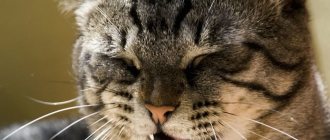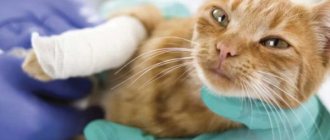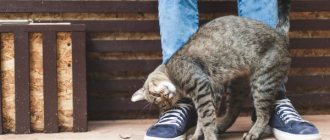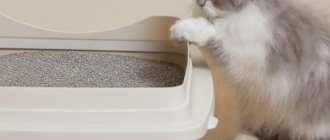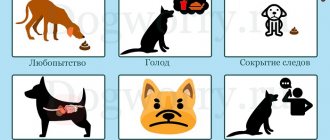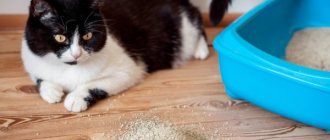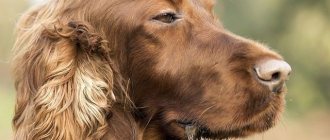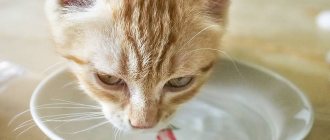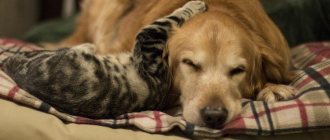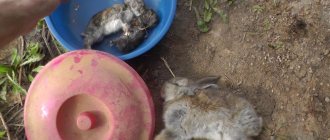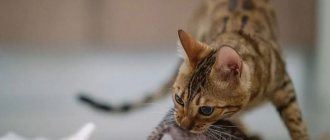10102Administration
Some owners find it very funny that their cat constantly licks itself. But there's not much fun in this. There are often cases where it is better to establish the exact reason for this behavior of your furry pet.
Cats lick their lips due to intense salivation. This does not mean that he is sick, but something is definitely bothering him, he is stressed or uncomfortable. In any case, if a cat constantly licks its lips, you need to observe it for several days and take into account other symptoms, manifestations and its behavior.
Main reasons
Reflex actions
A cat licks itself because it is its natural reflex, and it does not matter the breed of the animal or its lifestyle. A pet often licks its nose under the influence of the following factors:
- Variety of food. When a cat sees food or smells it, it reflexively begins to lick itself.
- Desire to drink. The problem often occurs in cats during the hot season or if the owners feed him dry food. It is important to ensure your pet has constant access to clean drinking water.
- Stress factor. If a cat is worried, he will often lick his nose and other parts of his body. In this way, the pet tries to calm down and get rid of unpleasant odors in the fur.
Veterinarians note that representatives of the cat family have very dry noses during sleep, as a result of which the cat periodically licks its lips and nose. This is due to blunting of receptor functions.
Attacks of nausea
An attack of nausea and vomiting in an animal provokes increased activity of the salivary glands, which is why it swallows and licks.
If your cat is constantly licking his lips and swallowing saliva, this may indicate impending vomiting. When a pet vomits, the function of the salivary glands increases, which is why the animal often smacks its lips. According to some studies, the bactericidal and lubricating properties of salivary fluid help prevent vomiting and facilitate the movement of processed foods in the larynx.
Worm infestation
If a kitten or adult frequently licks its lips, then it is worth checking your pet to see if it has worms. With helminthiasis, the animal is bothered by constant itching in the abdomen and other parts of the body. With intensive licking and scratching, wounds soon appear on the skin, which can become infected. In order to lick wounds, the cat produces more saliva.
Nervous tension
During washing, if there is severe overexcitation or if there is a feeling of danger, the pet feels stressed and anxious. Also, increased saliva production and frequent licking can be observed during estrus. When a cat licks itself, it calms itself and brings the state of its nervous system back to normal. In this case, owners should provide peace to the pet, if possible, calm it down and pet it more often.
Features of overgrooming
Under the influence of stress or dermatological pathologies, overgrooming can turn into a bad habit.
The disorder is characterized by frequent licking of the cat's fur. Various factors can influence pathology:
- dermatological diseases and diseases leading to skin problems;
- exposure to stress;
- unsanitary conditions in the cat’s habitat.
If your pet constantly licks its belly and other parts of its body, it will soon become restless. Overgrooming negatively affects the behavior of a pet and turns into a bad habit. If you don’t go to a veterinary clinic in time and start treating your cat, he will produce a large amount of saliva, as a result of which he needs to lick his lips often. Eliminating the problem requires a comprehensive therapeutic approach and patience on the part of the owners.
Manifestation of claustrophobia
If the cat often swallows, becomes nervous and does not eat, then this may indicate the manifestation of a similar pathology. Fear of confined spaces is observed in many cats, which can negatively affect the state of the pet’s nervous system. When a pet is nervous, its reflexes become stronger, resulting in hypersalivation, which the cat tries to get rid of by frequent licking.
Treatment of symptoms of scratching in cats
As mentioned above, there is a huge list of prerequisites that lead to a cat licking itself intensively. And you don’t need to think that the well-known proverb “to the guests” applies here. This can be a sign of very serious systemic diseases. In many cases, the condition of the skin and its diseases are only the visible cause of a problem hidden deep in the body. It is often very difficult to determine what causes the need to scratch in cats. The most common factors are shown in the table.
| Cause | How it manifests itself |
| Bacterial infections | Changes that accompany infections are:
There may be a characteristic purulent exudate that sticks to hair and envelops the skin in certain places. |
| Fungal | Ringworm in a cat is contagious; it can be picked up through direct contact with a sick animal or its environment (cage, combing brush, etc.). Itching is not a constant symptom of this disease. Clinical manifestations are varied and varied, with varying degrees of alopecia, erythema and scaly formation predominating. The changes are usually located on the face, head, neck and limbs, but it happens that they are also present on the body. |
| Parasites | Mites live in the stratum corneum of the epidermis without penetrating the hair follicle. The disease occurs with severe itching and peeling of the upper areas of the skin. Dandruff appears on her. These parasites are located on areas of the body covered with delicate skin, especially in the vicinity of the eyes, lips, abdomen, external genitalia, legs, head, ears. |
| Allergic street dermatitis | The most unpleasant discomfort and hypersensitivity reaction occurs due to antigens contained in the saliva of fleas. Why does a cat constantly lick itself and scratch itself if it has access to the outdoors? This allergic dermatitis is very difficult to diagnose. Even if you take care of your pet and constantly apply medications that prevent the spread of fleas, the presence of this disease cannot be completely ruled out. |
| Food allergies | Food allergies are a reaction of the immune system to certain proteins contained in food. It appears regardless of age and breed, but Siamese and Burmese cats are more predisposed. Main changes: itching of the facial part of the muzzle, head, neck, symmetrical baldness, dermatitis. In this case, it is better to feed the kitten vegetarian food. |
| Atopy | The disease is congenital, during which a hypersensitivity reaction develops after exposure to some environmental allergen. The main one is house dust mite, the secondary ones are flower pollen, desquamated epidermis, and mold. Additional symptoms may appear: rhinitis, cough, shortness of breath. |
| Increased sensitivity to insect bites | Occurs with the formation of skin changes and swelling of varying degrees of complexity: the ridge of the nose, changes in the sense of smell, ears and around the ears. Symptoms disappear after eliminating mosquitoes from the cat's environment. |
Before starting therapy, you need to determine the threshold of excitability of your four-legged companion. This means that if a cat's blood pressure is too high, he may not respond to the itch at all. And in many cases, a certain factor will not be enough to cause the feeling of the need to scratch. But when another stimulus is added to it, the threshold will be reached, and the cat will begin to lick itself more frequently. To simplify, we can say that the clinical manifestations of itching depend on both allergic and non-allergic factors.
READ What to do if your cat licks eggs
Itching appears only after adding several stimuli and exceeding the sensitivity threshold. Sometimes conventional treatment for complications can keep the cat below these limits, leaving the underlying allergic reaction asymptomatic.
Therefore, the use of potent drugs is not always effective; you must first find out the causes before treating complications.
The market offers a whole host of different forms of drugs for topical use.
The range is very large, for example:
- shampoos,
- ointments,
- gels,
- drugs such as spot-on,
- foam,
- blush,
- lotions.
What are the indications for local treatment and why treat immediately with tablets? Its advantages are as follows:
- Does not burden the body as a whole
- They are applied directly to the sore spot (the skin membrane is fully accessible, unlike other organs to which we do not have direct access).
- More gentle on the body
- No side effects
Do not immediately reach for strong and aggravating medications. It is clear that determining the reason why a cat constantly licks itself and itches is very difficult, the diagnostic road is painstaking. But use a softer method of treating the animal, while simultaneously persistently searching for the causes of the disease.
It is not the itching that needs to be treated, but the cause, that is, the pathology that causes discomfort and forces the pet to scratch. Only after an accurate diagnosis has been made, the doctor prescribes medications for external and internal use. What to do if it is not possible to immediately show your pet to a specialist when he scratched the wound hard? In this case, you need to treat the wound with an antiseptic solution and numb it.
Lotions made from a decoction of oak bark, calendula, chamomile, mint, etc. help to quickly remove itching at home. If the pet itches a lot, the wounds are treated with antipruritic, antiseptic and drying drugs. Depending on the cause of itching, the following treatment tactics are followed:
- fleas - wearing anti-parasitic collars, using special shampoos and sprays, drops on the withers;
- mites - cleansing the ear of pus and using acaricidal agents: sprays, emulsions, ointments, etc.;
- allergies - stopping contact with the allergen, taking antihistamines, desensitizing and sedative drugs, in severe cases - glucocorticoids;
- bacteria and fungi – strengthening the immune system, using antibacterial and antifungal drugs;
- hormonal disorders - injections of insulin, glucocorticosteroids, trilostane, etc., depending on the etiology of the disease.
To speed up recovery and prevent relapse of the disease, animals are prescribed vitamin complexes and immunostimulating drugs. In addition to taking medications, you need to monitor the cleanliness of your pet’s skin, provide it with balanced nutrition and rest. If the animal cannot resist the temptation to scratch its ear or neck, it must be wearing a protective collar.
What to do and how to help your pet?
Unhealthy licking of fur must be treated, for which the reasons that caused such behavior of the animal are eliminated and sedatives are given.
If the cat does not lick itself or, on the contrary, licks itself often, then find out what the causes of the problem are. Owners should determine whether there are fleas and other small parasites on the animal’s fur and skin. It is also recommended to remember whether the cat could have an allergy to the new shampoo or other irritants. To eliminate constant licking, you need to act on the original source of the problem. If the disorder is triggered by stress, the animal needs to be calmed, stroked, or given a sedative. When a cat does not lick itself or, on the contrary, constantly licks its fur due to claustrophobia, then it is worth giving the pet more space. If the source of licking is an infectious or other disease, then drug therapy using the following groups of drugs may be required:
- antibiotics;
- antimicrobial agents;
- sedatives;
- antihistamines.
To prevent frequent licking in cats, it is necessary to regularly carry out deworming, preventing the activity of worms in the cat's body.
Process Features
In the animal's body, saliva performs a number of important functions. First of all, it protects the cat’s teeth, gums and oral mucosa from any damage. It softens food to make it easier to swallow. And besides, it stimulates the receptors of the tongue.
This fluid is constantly produced by your pet's salivary glands. And when strong salivation occurs, it, accordingly, flows abundantly from the cat’s mouth. This process is called hypersalivation. And there can be many reasons for this phenomenon.
We recommend reading: After Vaccination Your Puppy Has Diarrhea What to Do
We suggest you read What to do if your cat has growths on the pads of her paws?
When do you need to see a veterinarian?
If your cat does not lick itself or, on the contrary, licks itself vigorously for several weeks or months, then you should consult a specialist. It is especially necessary to contact a veterinary clinic when the pet is lethargic and refuses water. Consultation with a veterinarian is necessary for hair loss and the appearance of bald patches. An allergic reaction that causes a cat to lick itself often can rarely be dealt with on its own. It is imperative to consult a specialist if you have nausea and vomiting, which may indicate impaired functioning of the kidneys, liver and urinary system. To make a diagnosis, the doctor will prescribe various procedures, based on the results of which further treatment is selected.
Etiology
Pharyngeal dysphagia in dogs and cats occurs primarily as an acquired disorder due to neuropathy, myopathy, and synaptic dysfunction (for example, localized myasthenia gravis). Failure to form a normal food bolus at the base of the tongue and/or to push the bolus into the esophagus is often associated with damage to cranial nerves IX or X. Concurrent dysfunction of the cranial esophagus can result in food retention just behind the cricopharyngeal sphincter.
We recommend reading: Are people allergic to cat food?
Manifestations of drooling in cats
Hypersalivation (ptialism) - increased production of saliva. In cats, it can occur both for physiological reasons, which do not pose a danger and do not require the intervention of a veterinarian, or indicate the development of a pathological condition. The latter may be non-contagious - not posing a threat to the health of surrounding people and animals, but it may also pose a danger.
Increased salivation can be expressed in the following symptoms:
- saliva flows from the cat's mouth and drips onto the floor;
- the cat's chin and paws become wet with saliva;
- the cat constantly swallows saliva;
- the cat rubs its face against various objects;
- the cat begins to wash itself frequently and lick its fur;
- “icicles” appear on the fur due to the gluing of hairs with saliva;
- wet spots remain where the cat was recently;
- The tongue falls out of the mouth.
A cat's drooling can vary in intensity.
